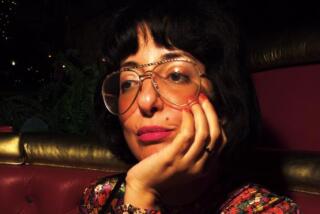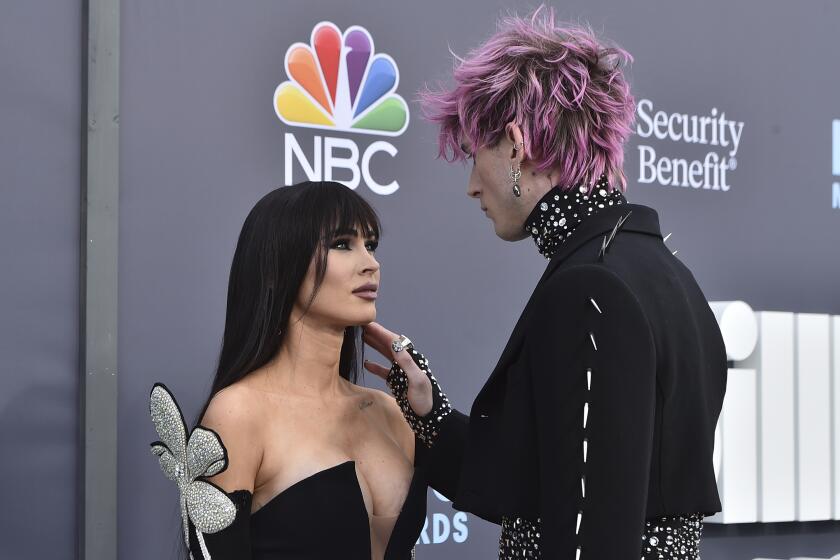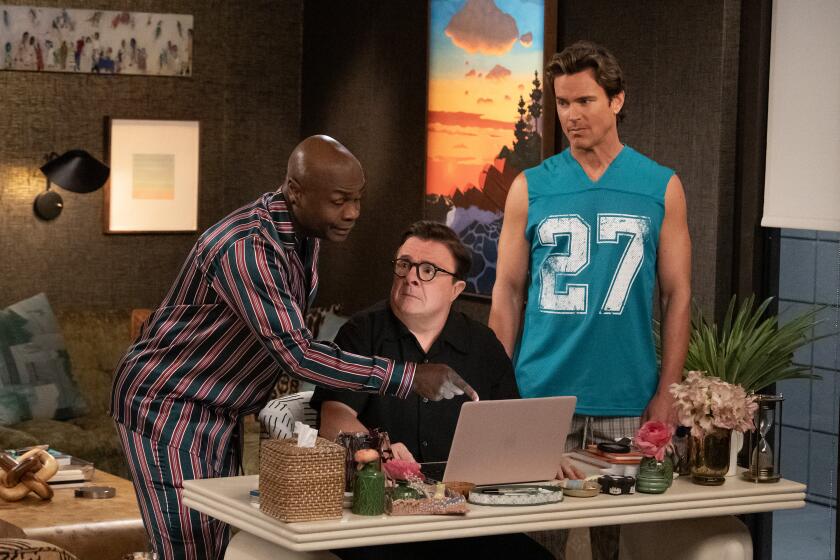New books shed light on plight of women in Middle East
- Share via
This month, several outstanding new books on the lives of women illuminate the daily challenge, joy and unfathomable outrage women and girls experience in these countries. Reading them all is a bit overwhelming — like looking into a crystal ball or at an aleph. If it is true that women are the heart and soul of a culture, their suffering indicates a sick one. There is a reason why books such as “The Diary of Anne Frank” or “Zlata’s Diary” live on through generations and are used to show the imperative of transformation, the cruelty of certain regimes.
Why now? Stories form a critical mass; women and girls gather courage as the stories of others are published. And our ear, our understanding, is educated and expanded. Some of these books are calls for action; one is a spirited, even joyful account (of a young American woman who goes to live in a harem), one is a cry of pure pain, one is a look at the lack of economic opportunities for women and one is the story of a brave little girl.
I Am Nujood, Age 10 and Divorced
Nujood Ali with Delphine Minoui
Three Rivers Press: 188 pp., $12
Nujood Ali was born in Yemen, the country of the Queen of Sheba. Nujood’s mother had 16 children: Four died between ages 2 months and 4 years. Uncertain of the year of her birth, around age 8, 9 or 10, in 2008, her father told her she was to be married to a man three times her age. The family needed the money. After months of being beaten and raped by her “husband,” Nujood went to a courthouse and asked to see a judge. The judge was appalled; he was used to girls of 15 and older being married but not one this young. Because she is so young, she has no identifying papers, not even a birth certificate. She is too young to press charges. Once she has left her husband’s house, her parents lock their doors and will not let her return home. With the help of a passionate female lawyer, Nujood attracts attention inside and outside the country, wins her divorce, inspires other girls to challenge their families and comes to New York to be named Woman of the Year by Glamour Magazine. The book is beautiful and clear — Nujood’s love for her country survives even as her childhood is stolen from her.
Paradise Beneath Her Feet
How Women Are Transforming the Middle East
Isobel Coleman
Random House: 302 pp., $26
There is far more at stake for the women’s movement in Islamic countries than attaining certain rights. At this point in history, Coleman writes, “Islamic feminism is an important emotional and intellectual stepping stone — and tactic — to reconcile religion with the demands of the modern world.” Coleman describes the work of activists fighting within the confines of Islamic law to create opportunities across cultures — in business, education and even government. Rather than trying to separate women from Islam, many of these organizations seek to limit the extremism that impedes progress. Some of the leading proponents of Islamic feminism are men who argue that “Islam was radically egalitarian for its time and remains so in many of its texts.” Practices toward women, they continue, “like those of the Taliban, in fact represent a subversion of Islamic teaching.” Coleman focuses on the grassroots appeal of the movement. She takes us into remote villages and urban bureaucracies to find the brave men and women working to create change in the Middle East.
Some Girls
My Life in a Harem
Jillian Lauren
Plume: 340 pp., $15
Jillian Lauren answered an ad for an audition. Living in the East Village and spending most of her time with impoverished students and artists, Lauren was losing confidence in her movie career. She dropped out of NYU theater school and tried waitressing “for about forty minutes… before I shucked my duds and got up on the stage in a borrowed G-string.” Lauren didn’t work long before she was offered $20,000 to look pretty at the parties of a wealthy businessman. She packed her bags and flew to Brunei, where she spent 18 months in the harem of the Sultan of Brunei’s youngest brother, Prince Jefri Bolkiah. Like a reality TV show, several girls who arrive with Lauren are given bedrooms in a slightly “tacky mini-palace.” She meets the group of 40 women of all nationalities who live in the palace and is shown proper Muslim customs. “I started out the belle of the ball,” she writes, “but I became the crazy lady in the attic.” Lauren describes the bickering and back-stabbing in the harem and her desire to be chosen each night. She returns to New York with well over $100,000 in jewelry, designer clothes and $20,000 in cash: “I didn’t suffer under the illusion that I had some bit life to which to return. The dream of stardom that had lit my way until then was dimming, even smoldering.” Lauren goes back a few times, enough to earn the money to hire a private investigator to find her birth mother. Lauren tells the story straight, without much moralizing, but the corruption of the aristocrats, the powerlessness of the women and the destitution of life outside the harem speaks for itself.
Between Two Worlds
My Life and Captivity in Iran
Roxana Saberi
Harper: 322 pp., $25.99
In January of last year, 31-year-old Roxanna Saberi, an Iranian-American journalist working on a book in Iran, was accused of espionage and sentenced to eight years in Evin, Iran’s most notorious prison. After 3 1/2 months and a hunger strike, she was released on appeal. Here, she recounts the stories of her fellow prisoners, human rights workers and others, many of whom were arrested for their religious or political beliefs. Saberi believes in the future of Iran; she draws important distinctions between the people and the hard-line extremists in power. She was saved by international attention to her case and makes a plea for increased international vigilance.”I saw the dark and bright sides of human nature,” she writes of her months in prison, “including my own. I hope this account can also help shed light on events unfolding in Iran, where many people have gone through similar or much more difficult ordeals, but few have been free to speak of them.”
Salter Reynolds is a writer in Los Angeles.
More to Read
The biggest entertainment stories
Get our big stories about Hollywood, film, television, music, arts, culture and more right in your inbox as soon as they publish.
You may occasionally receive promotional content from the Los Angeles Times.










